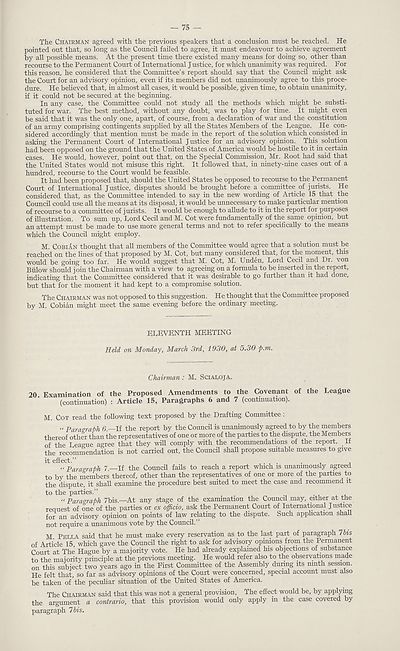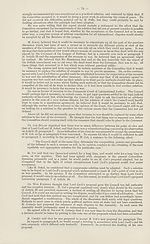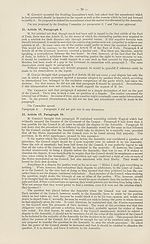Legal > Committee for the amendment of the Covenant of the League of Nations in order to bring it into harmony with the pact of Paris
(79)
Download files
Complete book:
Individual page:
Thumbnail gallery: Grid view | List view

— 75 —
The Chairman agreed with the previous speakers that a conclusion must be reached. He
pointed out that, so long as the Council failed to agree, it must endeavour to achieve agreement
by all possible means. At the present time there existed many means for doing so, other than
recourse to the Permanent Court of International Justice, for which unanimity was required. For
this reason, he considered that the Committee’s report should say that the Council might ask
the Court for an advisory opinion, even if its members did not unanimously agree to this proce¬
dure. He believed that, in almost all cases, it would be possible, given time, to obtain unanimity,
if it could not be secured at the beginning.
In any case, the Committee could not study all the methods which might be substi¬
tuted for war. The best method, without any doubt, was to play for time. It might even
be said that it was the only one, apart, of course, from a declaration of war and the constitution
of an army comprising contingents supplied by all the States Members of the Teague. He con¬
sidered accordingly that mention must be made in the report of the solution which consisted in
asking the Permanent Court of International Justice for an advisory opinion. This solution
had been opposed on the ground that the United States of America would be hostile to it in certain
cases. He would, however, point out that, on the Special Commission, Mr. Root had said that
the United States would not misuse this right. It followed that, in ninety-nine cases out of a
hundred, recourse to the Court would be feasible.
It had been proposed that, should the United States be opposed to recourse to the Permanent
Court of International Justice, disputes should be brought before a committee of jurists. He
considered that, as the Committee intended to say in the new wording of Article 15 that the
Council could use all the means at its disposal, it would be unnecessary to make particular mention
of recourse to a committee of jurists. It would be enough to allude to it in the report for purposes
of illustration. To sum up, Ford Cecil and M. Cot were fundamentally of the same opinion, but
an attempt must be made to use more general terms and not to refer specifically to the means
which the Council might employ.
M. Cobian thought that all members of the Committee would agree that a solution must be
reached on the lines of that proposed by M. Cot, but many considered that, for the moment, this
would be going too far. He would suggest that M. Cot, M. Unden, Ford Cecil and Dr. von
Billow should join the Chairman with a view to agreeing on a formula to be inserted in the report,
indicating that the Committee considered that it was desirable to go further than it had done,
but that for the moment it had kept to a compromise solution.
The Chairman was not opposed to this suggestion. He thought that the Committee proposed
by M. Cobian might meet the same evening before the ordinary meeting.
EFEVENTH MEETING
Held on Monday, March 3rd, 1930, at 5.30 p.m.
Chairman : M. Sciaroja.
20 Examination of the Proposed Amendments to the Covenant of the League
(continuation) : Article 15, Paragraphs 6 and 7 (continuation).
M. Cot read the following text proposed by the Drafting Committee :
" Paragraph 6.—If the report by the Council is unanimously agreed to by the members
thereof other than the representatives of one or more of the parties to the dispute, the Members
of the Feague agree that they will comply with the recommendations of the report. It
the recommendation is not carried out, the Council shall propose suitable measures to give
it effect.”
" Paragraph 7.—If the Council fails to reach a report which is unanimously agreed
to by the members thereof, other than the representatives of one or more of the parties to
the dispute, it shall examine the procedure best suited to meet the case and recommend it
to the parties.”
- Paragraph 7bis.—At any stage of the examination the Council may, either at the
request of one of the parties or ex officio, ask the Permanent Court of International Justice
for an advisory opinion on points of law relating to the dispute. Such application shall
not require a unanimous vote by the Council.”
M PETRA said that he must make every reservation as to the last part of paragraph Ibis
of Article 15 which gave the Council the right to ask for advisory opinions from the Permanent
Court at The Hague by a majority vote. He had already explained his objections of substance
to the majority principle at the previous meeting. He would refer also to the observations made
on this subject two years ago in the First Committee of the Assembly during its ninth session.
He felt that, so far as advisory opinions of the Court were concerned, special account must also
be taken of the peculiar situation of the United States of America.
The Chairman said that this was not a general provision, The effect would be, by applying
the argument a contrario, that this provision would only apply in the case covered by
paragraph 7bis.
The Chairman agreed with the previous speakers that a conclusion must be reached. He
pointed out that, so long as the Council failed to agree, it must endeavour to achieve agreement
by all possible means. At the present time there existed many means for doing so, other than
recourse to the Permanent Court of International Justice, for which unanimity was required. For
this reason, he considered that the Committee’s report should say that the Council might ask
the Court for an advisory opinion, even if its members did not unanimously agree to this proce¬
dure. He believed that, in almost all cases, it would be possible, given time, to obtain unanimity,
if it could not be secured at the beginning.
In any case, the Committee could not study all the methods which might be substi¬
tuted for war. The best method, without any doubt, was to play for time. It might even
be said that it was the only one, apart, of course, from a declaration of war and the constitution
of an army comprising contingents supplied by all the States Members of the Teague. He con¬
sidered accordingly that mention must be made in the report of the solution which consisted in
asking the Permanent Court of International Justice for an advisory opinion. This solution
had been opposed on the ground that the United States of America would be hostile to it in certain
cases. He would, however, point out that, on the Special Commission, Mr. Root had said that
the United States would not misuse this right. It followed that, in ninety-nine cases out of a
hundred, recourse to the Court would be feasible.
It had been proposed that, should the United States be opposed to recourse to the Permanent
Court of International Justice, disputes should be brought before a committee of jurists. He
considered that, as the Committee intended to say in the new wording of Article 15 that the
Council could use all the means at its disposal, it would be unnecessary to make particular mention
of recourse to a committee of jurists. It would be enough to allude to it in the report for purposes
of illustration. To sum up, Ford Cecil and M. Cot were fundamentally of the same opinion, but
an attempt must be made to use more general terms and not to refer specifically to the means
which the Council might employ.
M. Cobian thought that all members of the Committee would agree that a solution must be
reached on the lines of that proposed by M. Cot, but many considered that, for the moment, this
would be going too far. He would suggest that M. Cot, M. Unden, Ford Cecil and Dr. von
Billow should join the Chairman with a view to agreeing on a formula to be inserted in the report,
indicating that the Committee considered that it was desirable to go further than it had done,
but that for the moment it had kept to a compromise solution.
The Chairman was not opposed to this suggestion. He thought that the Committee proposed
by M. Cobian might meet the same evening before the ordinary meeting.
EFEVENTH MEETING
Held on Monday, March 3rd, 1930, at 5.30 p.m.
Chairman : M. Sciaroja.
20 Examination of the Proposed Amendments to the Covenant of the League
(continuation) : Article 15, Paragraphs 6 and 7 (continuation).
M. Cot read the following text proposed by the Drafting Committee :
" Paragraph 6.—If the report by the Council is unanimously agreed to by the members
thereof other than the representatives of one or more of the parties to the dispute, the Members
of the Feague agree that they will comply with the recommendations of the report. It
the recommendation is not carried out, the Council shall propose suitable measures to give
it effect.”
" Paragraph 7.—If the Council fails to reach a report which is unanimously agreed
to by the members thereof, other than the representatives of one or more of the parties to
the dispute, it shall examine the procedure best suited to meet the case and recommend it
to the parties.”
- Paragraph 7bis.—At any stage of the examination the Council may, either at the
request of one of the parties or ex officio, ask the Permanent Court of International Justice
for an advisory opinion on points of law relating to the dispute. Such application shall
not require a unanimous vote by the Council.”
M PETRA said that he must make every reservation as to the last part of paragraph Ibis
of Article 15 which gave the Council the right to ask for advisory opinions from the Permanent
Court at The Hague by a majority vote. He had already explained his objections of substance
to the majority principle at the previous meeting. He would refer also to the observations made
on this subject two years ago in the First Committee of the Assembly during its ninth session.
He felt that, so far as advisory opinions of the Court were concerned, special account must also
be taken of the peculiar situation of the United States of America.
The Chairman said that this was not a general provision, The effect would be, by applying
the argument a contrario, that this provision would only apply in the case covered by
paragraph 7bis.
Set display mode to:
![]() Universal Viewer |
Universal Viewer | ![]() Mirador |
Large image | Transcription
Mirador |
Large image | Transcription
Images and transcriptions on this page, including medium image downloads, may be used under the Creative Commons Attribution 4.0 International Licence unless otherwise stated. ![]()
| League of Nations > Legal > Committee for the amendment of the Covenant of the League of Nations in order to bring it into harmony with the pact of Paris > (79) |
|---|
| Permanent URL | https://digital.nls.uk/191509839 |
|---|
| Shelfmark | LN.V |
|---|
| Description | Over 1,200 documents from the non-political organs of the League of Nations that dealt with health, disarmament, economic and financial matters for the duration of the League (1919-1945). Also online are statistical bulletins, essential facts, and an overview of the League by the first Secretary General, Sir Eric Drummond. These items are part of the Official Publications collection at the National Library of Scotland. |
|---|---|
| Additional NLS resources: |
|

